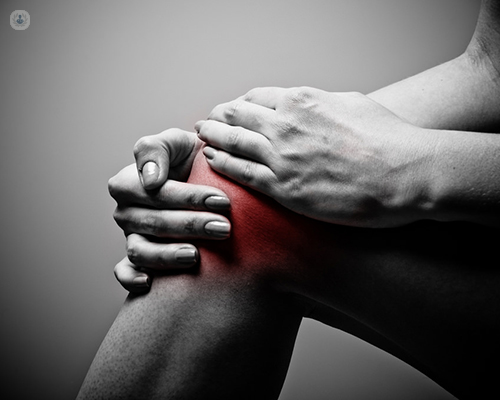

What is knee arthritis?
Arthritis of the knee is inflammation of the knee joints. It is characterised by pain, swelling and inflammation, and eventually restriction in movement. Arthritis affects different joints in the body, but very commonly it affects the knees. Knee arthritis mainly affects adults, however, some types of knee arthritis can affect children.
There are different types of knee arthritis, of which knee osteoarthritis is the most common. Knee osteoarthritis is degenerative, developing through wear-and-tear and the wearing-away of knee cartilage between bones. Rheumatoid arthritis of the knee is a chronic autoimmune disease in which the synovial membrane in the knees become inflamed, causing pain and stiffness. Lastly, post-traumatic arthritis of the knee results following injury to the knees (e.g. after a broken bone or knee ligament tear).

Prognosis of knee arthritis:
Knee arthritis is degenerative and it will worsen without treatment. We currently do not have a cure for knee arthritis, but treatments aim to relieve the symptoms of pain and disability.
Symptoms of knee arthritis:
Knees affected by arthritis are commonly painful and inflamed (swollen). Other common symptoms associated with knee arthritis include:
Medical tests to diagnose knee arthritis:
To diagnose knee arthritis, you will have a thorough physical examination in which swelling, stiffness, pain, instability and signs of injury to the knee tissue will be assessed for. You will also have an X-ray of the affected knee, and occasionally you will have an MRI or CT scan. You may also have blood tests to determine which type of knee arthritis you have (i.e. for rheumatoid arthritis).
What are the causes of knee arthritis?
There are different factors that can cause or contribute to knee arthritis developing. These may include:
Can knee arthritis be prevented?
Certain types of knee arthritis cannot be prevented, however, you can try to reduce the risk of the wear-and-tear varieties developing. For example, maintaining a healthy weight can help to reduce the load put on your knees, protecting the knee joint tissues from damage. It is also important to have any knee injuries treated, and any physiotherapy practised properly. Lastly, eating healthily and exercising to strengthen the knee joints are helpful, with the safest exercises for the knees being swimming and cycling.
Treatments for knee arthritis:
Treatment for knee arthritis focuses on relieving the pain, inflammation and lack of mobility.
Non-surgical treatment of knee arthritis comprises of:
If your knee arthritis has progressed to the point that the pain and disability are not relieved by non-surgical treatments, surgery may be recommended.
Surgical treatments for knee arthritis include:
Which type of specialist treats knee arthritis?
Knee arthritis may be treated by orthopaedic surgeons or rheumatologists, depending on the type of knee arthritis you have.
